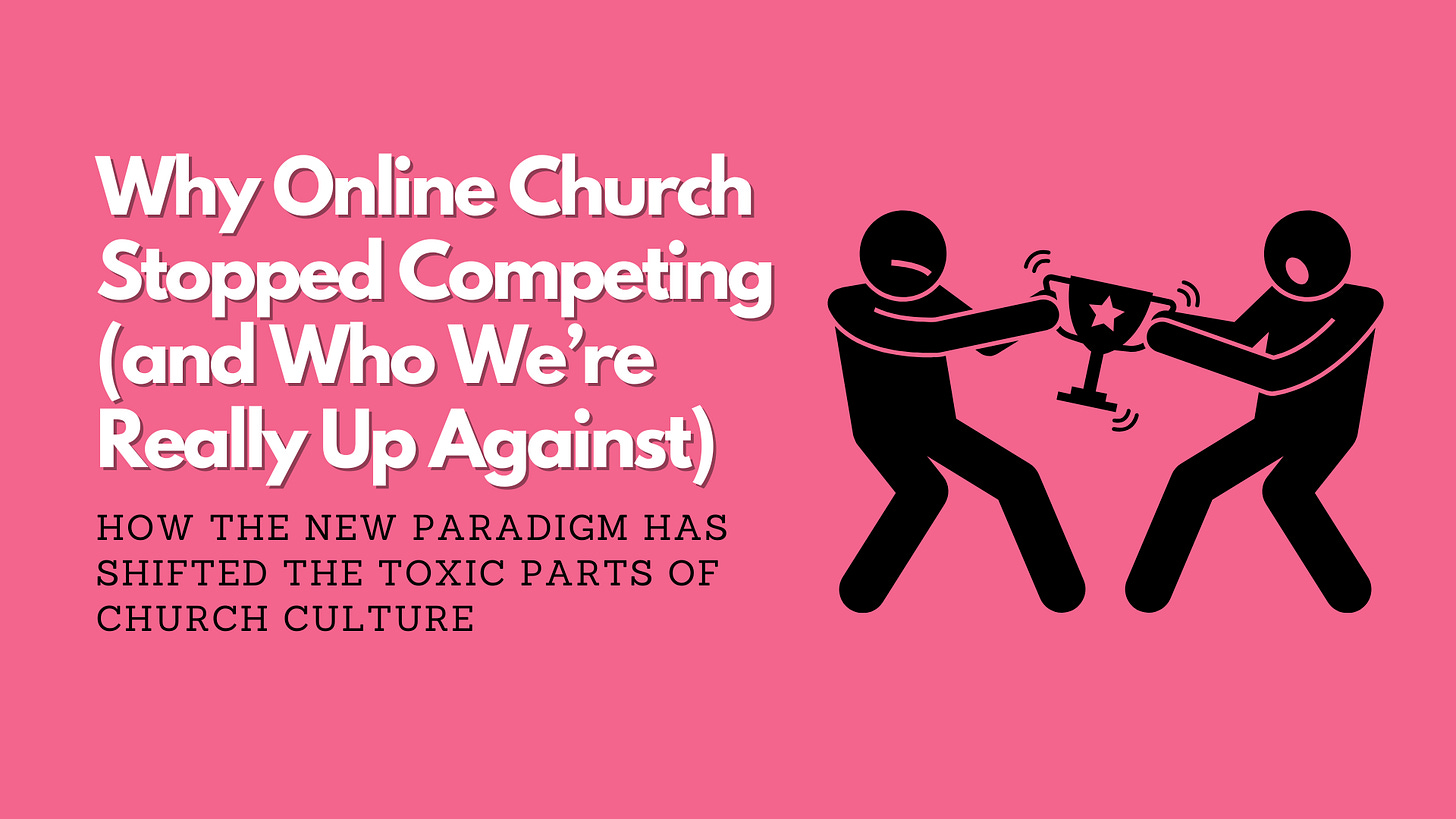Church Online Eliminated Church Competition Syndrome
How the new paradigm has shifted the toxic parts of church culture
I’ll never forget whenever I first stepped into church planting and someone warned me about how competitive churches were with the ‘new church on the block.’
At first, I was stunned. We’re supposed to support one another—how could we mess this up?
Whenever I entered the digital landscape, I discovered that this wasn’t only untrue of churches online, but that there is more reason than ever for the connectional nature of the Church to thrive.
Avoiding the Temptation
When churches step into digital spaces, we often assume the competition is other churches.
The logic goes something like this: if another pastor is pulling higher numbers on Instagram, then they’re “winning” in ways I’m not. If another church has flashier graphics on YouTube, they must be the ones drawing people away from my community. If a missionary streamer has more subs on Twitch, I need to hustle harder to catch up.
But I don’t buy it.
Checkpoint’s competition isn’t Love Thy Nerd.
It’s not First United Methodist down the road.
Those ministries are our co-laborers. When they succeed, the Kingdom of God expands. We are on the same team.
The real competition isn’t each other—it’s the platforms themselves.
A Common Rival
A poignant moment in the recent Fantastic Four movie features the entire population of Earth focused on the global threat of Galactus. They work together in ways thought impossible against an entity larger than any seen before.
The Church has long been focused on neighborhood competitions. But the digital era has introduced a galactic opponent—the superpowers known as algorithms.
Our competition is the infinite scroll of Facebook.
Our competition is the Instagram feed, tuned by engineers to keep you swiping just one more time.
Our competition is TikTok’s “For You” page, pulling you deeper into a rabbit hole.
Our competition is the YouTube subscription list that can fill every waking hour.
That’s who we are up against: billion-dollar algorithms designed to harvest attention.
So when I sit down to make a piece of content, I’m not thinking about how to beat another church in views. I’m thinking about what it will take for someone to pick up their phone and choose Checkpoint’s Discord over the endless scroll.
That’s the reason we post on Instagram, TikTok, or YouTube at all—not to win the platforms, but to invite people away from the noise and into a space that has been intentionally sanctified.
Because here’s the shift we need to make: we aren’t just wanderers online, hoping to bump into someone who needs a word of grace.
That’s good, but it’s not enough.
We also need to build homes—sacred spaces that can stand in direct competition with the algorithm. Places where community isn’t measured by views or clicks, but by trust, belonging, and transformation.
Where Everybody Knows Your Name
Checkpoint isn’t the only one called to build these sanctified spaces. If anything, our work has shown just how necessary it is to equip and support others in doing the same.
This is the heartbeat of the Digital Missional Network.
DMN isn’t meant to be another “home base” for Christians online. Instead, it’s a workshop, a greenhouse, a forge—pick your metaphor—for people who are planting their own digital ministries. We need to be in connection, not competition. Those days are gone.
The Digital Missional Network is a place where creators, pastors, and innovators can share best practices, troubleshoot challenges, and remind one another that the work matters.
And just this week, we added a self-promo channel. Why? Because the truth is, we need to support each other. We don’t win this fight by competing with each other’s content; we win it by amplifying each other’s voices so the algorithm has fewer opportunities to drown us out. When you post a new video, drop a sermon, launch a podcast, or start a project—we want to celebrate and share it. That’s how networks grow. That’s how ministries survive in digital-first spaces.
The platforms are not going to give us the tools to thrive. They’re not in the business of equipping churches. They’re in the business of keeping eyes glued to screens for advertisers. Which means we have to equip each other. We have to remind each other that we’re not alone in this fight.
That’s what DMN is for.
If you’ve been following Pixel & Pulpit for a while and you’ve felt the nudge—now’s the moment. Upgrade to a paid subscription and you’ll gain access to the Digital Missional Network. It’s not just another Discord server. It’s a collective of people building the church in the digital wilderness, committed to supporting one another so the Kingdom breaks through in spaces that Silicon Valley didn’t intend.
Need a refresher on what this Missional Network thing is all about?
Because our competition isn’t each other.
Our competition is the algorithm.
And the only way to win is together.
World 3-23 Complete
Q: What’s the biggest threat to digital ministry?
A: The “Skip Intro” button.




